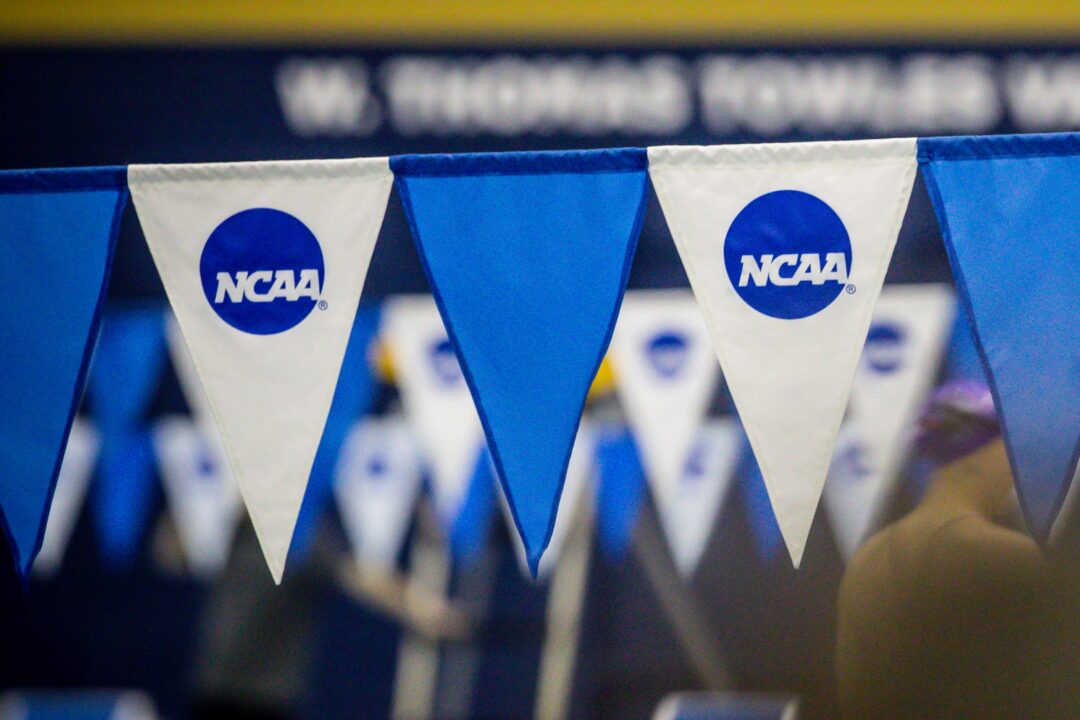At the end of the 1991 Swimming World Championships in Perth, Australia, U.S. team director Dennis Pursley had something he needed to get off his chest. It wasn’t about the meet that had just happened, but the upcoming 1991-92 NCAA season. New rules limiting practice time and season length had just gone into effect, and he was not pleased.
The new bylaws capped the swim season at 144 days and prohibited coaches from running practices outside the designated season. They also limited the number of competition days to 16 per season, excluding championship meets.
To Pursley, the new rules were a “roadblock” to U.S swimming’s success on the international scene. He thought constraining practice time meant athletes would not be able to swim well at both the college and international level.
These rules Pursley bemoaned are still in place today. With the advantage of hindsight, we know that these rules have not had the feared effect. Both the women’s and men’s Division I NCAA Championships were the fastest ever. Across both meets, Olympians won 17 out of 26 individual events.
Not only have American swimmers not stumbled on the “roadblock” but the NCAA has increasingly attracted international talent. At the men’s Division I NCAA championship, there were six individual non-American champions. After his 100 fly win, Andrei Minakov (jokingly?) asked if it was worth changing the name of the meet. The NCAA has become a destination for Americans and international swimmers alike, despite the limits on practice and competition time.
The 1991 U.S World Championship team was coming off a successful meet. They won 22 medals in the pool, including 13 gold. “It was probably the only meet where the staff unanimously felt we wouldn’t change anything if we had to do it over again,” Pursley said. He worried the U.S’s momentum would disappear because of the new rules and the U.S would be caught flat-footed at the 1992 Olympics.
At those Olympics, the U.S topped the medal table, winning 27 medals. 11 swimmers, a quarter of that team, were in college at the time. They had swum a year under the new bylaws and still made the Olympic team.

Only Leon can answer this, but since NCAAs and his top ten in the world performance in the 400 IM… did he restrict his hours to 8 per week in the two week “off season”. Optional is fine let those that want to be great be great. Forcing anyone to do anything can easily get out of hand and become detrimental. However, how many of us need more than “optional” to show up for 20 hours of grueling work, and how many of us would opt out without support. Coaches in many schools struggle to give or encourage that kind of commitment in fear of being reported anonymously by a by an athlete that doesn’t want or need to make… Read more »
This is waaay out of left field haha. But yeah 30 years later the NCAA mostly still ignores complaints. Too bad, they might have more support if they considered constructive criticism.
The word “optional” applied to just about everything outside of the water. But optional also meant that you had the option to not be put on the travel squad… I believe this rule change accelerated the shift in training philosophy from distance for everyone, to training with a purpose. The 1990’s saw a few programs become power-houses in sprinting as they were the first to develop a focused training method. Examples were Minnesota, Auburn, etc.
Yeah 144 days of practices and then the other 200ish are “optional”
Janet Evans went pro around this same time and stopped competing for Stanford. For those that were around the swimming scene back then, was this one of the factors leading to her decision?
Think so.
Apparently she wanted to go somewhere where she could swim without so much academic pressure. Not sure how much this played a part, if any.
But what if we’d be doing even BETTER without the rule changes?? And what if I didn’t fall down that open elevator shaft directly onto my head??
I remember filling out a “timecard” each week to make sure we were not going over 20 hours a week. That didn’t last long with every athlete having to do it. Wonder if it was actually someone’s job to go through them or they were just thrown away? It changed nothing about our training. Classic NCAA. Never has to make sense, just aggravate people to no end.